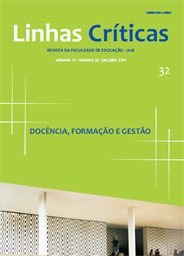Teaching as a profession: social representationsof female teachers in basic education
DOI:
https://doi.org/10.26512/lc.v17i32.3675Keywords:
Social representation, Profession, TeacherAbstract
The article analyzes the social representations of being a teacher. To understand the symbolic nature of the profession, we adopted the Theory of Social Representations. Twenty permanent teachers from Jaboatão dos Guararapes, PE, participated in the study. A collection procedure used was the interview. Content analysis guided the interpretation of data. The results indicate that the concept of vocation is pervasive in these representations. Other frequent subjects of comments are lack of recognition, accumulated work shifts, and low pay. The results constitute a warning for public polices to rescue the valuing and social recognition of teachers.
Downloads
References
ALVES-MAZZOTTI, Alda Judith. Representações da identidade docente: uma contribuição para aformulação de políticas. Ensaio: avaliação e Políticas Públicas de Educação, Rio de Janeiro, v. 15, n.57, p. 579-594, out./dez. 2007.
BARDIN, Laurence. Análise de Conteúdo. Lisboa: Edições 70, 2002.
BASSO, Itacy Salgado. Significado e sentido do trabalho docente. Cadernos Cedes, vol. 19, n. 44, p. 19-32, abril, 1997.
BRZEZINSKI, Ãria. A formação e a carreira de profissionais da educação na LDB 9.394/96: possibilidadese perplexidades. In: BRZEZINSKI, Ãria (Org.). LDB interpretada: diversos olhares se entrecruzam. 7.ed. São Paulo: Cortez, 2002. p. 147-167.
ENGUITA, Mariano. A ambigüidade da docência entre o profissionalismo e a proletarização. RevistaTeoria e Educação, Porto Alegre, n. 4, p. 41-61, 1991.
ESTEVE, Jose Manuel. Mudanças Sociais e função docente. In: NÓVOA, Antonio (Org.). ProfissãoProfessor. Lisboa: Porto Editora, 1995. p. 93-124.
JODELET, Denise. Representações Sociais: um domínio em expansão. In: JODELET, Denise (Org.).As Representações Sociais. Tradução: Lilian Ulup. Rio de Janeiro: Eduerj, 2001. p. 17-44.
IMBERNÓN, Francisco. Formação docente e profissional:formar-se para a mudança e a incerteza.2. ed. São Paulo: Cortez, 2001.
MADEIRA, Margot Campos. Representações Sociais de Professores sobre a própria profissão: Ã busca de sentidos. Universidade Católica de Petrópolis ”“ UCP. Disponível em: Acesso: em 22 mai. 2006.
MAURÃCIO, Lucia Velloso. A opção pelo magistério representada por professoras de ensinofundamental em memoriais. Educação em Revista, Belo Horizonte, v. 25, n. 1, p. 115-138, abr. 2009.
MINAYO, Maria Cecília. Desafio do Conhecimento: pesquisa qualitativa em saúde. 7. ed. São Paulo:HUCITEC, 2000.
MOSCOVICI, Serge. A representação social da psicanálise. Rio de Janeiro: Zahar, 1978.
_________. Representações Sociais:Investigações em Psicologia Social. Petrópolis: Vozes, 2003.
NÓVOA, Antonio (Org.). Profissão Professor. 2. ed. Porto: Porto, 1999.
PAREDES, Eugenia Coelho. Entrevista: anotações para pesquisadores iniciantes. In: MENIN, MariaSuzana; SHIMIZU, Alessandra (Orgs.). Experiência e representação social:questões teóricas e meto-dológicas. São Paulo: Casa do Psicólogo, 2005. p.131-156.
POPKEWITZ, Tomás. Profissionalização e formação de professores: algumas notas sobre a suahistória, ideologia e potencial. In: NÓVOA, Antonio (Coord.). Os professores e sua formação.Lisboa:Dom Quixote, 1995.
SACRISTÁN, Jose Gimeno. Consciência e acção sobre a prática como libertação profissional dos professores. In: NÓVOA, Antonio (Org.). profissão Professor.2. ed. Porto: Porto, 1999.
SHIMIZU, Alessandra de Morais et al. Representações Sociais sobre identidade e trabalho docente: a formação inicial em foco.In:Anais da 31ª Reunião Anual da ANPED, 31, Caxambu, 2008.
SPINK, Mary Jane. O conhecimento no cotidiano:as Representações Sociais na perspectiva da psicologia. São Paulo: Brasiliense, 1995.
VALLE, Ione Ribeiro. Da “identidade vocacional” Ã “identidade profissional”:a constituição de um corpodocente unificado. Perspectiva,Florianópolis, v. 20, n. Especial, p. 209-230, jul./dez. 2002.
Downloads
Published
How to Cite
Issue
Section
License
Copyright (c) 2016 Linhas Críticas

This work is licensed under a Creative Commons Attribution 4.0 International License.
Authors who publish in this journal agree to the following terms:
-Authors maintains the copyright and grants the journal the right of first publication, the work being simultaneously licensed under the Creative Commons Attribution License which allows the sharing of the work with recognition of the authorship of the work and initial publication in this journal.
- Authors are authorized to enter into additional contracts separately, for non-exclusive distribution of the version of the work published in this journal (eg publish in institutional repository or as a book chapter), with acknowledgment of authorship and initial publication in this journal.
-Authorers are allowed and encouraged to publish and distribute their work online (eg in institutional repositories or on their personal page) at any point before or during the editorial process, as this can generate productive changes as well as increase the impact and the citation of published work (See The Effect of Free Access).



